In today’s modern, fast-paced world, we look to StackOverflow, Reddit, and hands-on courses to learn about computer science and software engineering. But there are some real benefits to using books as an additional resource.
When studying computer science, books are:
- Reputable. Anyone can publish a blog post; only experts who are carefully vetted can write a book through a publisher. If they didn’t go through a traditional publishing house, then reviews and word-of-mouth can let you know if it’s a good information source or not
- Written for comprehension. A book is written to be read. A blog is written to rank in Google.
- Easily selected. Online, you have to trust SEO to deliver the best results. Something titled ‘for beginners" might not actually be for beginners. Books, thanks to a more rigorous selection process, tend to be better marketed. The titles are also more descriptive and less clickbait.
- Structured for completion. A blog will give you a solitary answer. A book will give you the answer in the context of all the other information you need to make sense of that answer.
- Satisfying to hold. As a computer scientist, I’ve spent a lot of time staring at screens. Sometimes it’s nice to hold something physical for a change.
If you want to construct a comprehensive, learnable, achievable computer science curriculum for yourself, it’s wise to include books as a key starting point.
Persuaded? Good. Let’s talk about the best CS books out there.
Author’s note: you can find many of these computer science books in PDF format. I’m linking to places where you can buy them because I believe in supporting and respecting the authors if you have the funds to do so. But, if you don’t, then I also believe in learning without limits. If you download a PDF of one of these books and it helps you get a job later on, consider supporting that author financially as a thank-you. If you do find free resources, make sure they’re legal.
Top CS Books for Beginners 🔗
If you’re just starting out learning to code, these are the best textbooks. I’ve done my best to compile a list of books about CS that don’t require a lot of knowledge, are geared for beginners, and help you hit the ground running. That said, I highly recommend not starting with books as your primary medium for learning computer science in 2023. Interactive courses that force you to write real code and provide immediate feedback are a much better way to learn. Check out Boot.dev if that style of learning sounds interesting to you.
1. Everything You Need to Ace Computer Science and Coding in One Big Fat Notebook 🔗
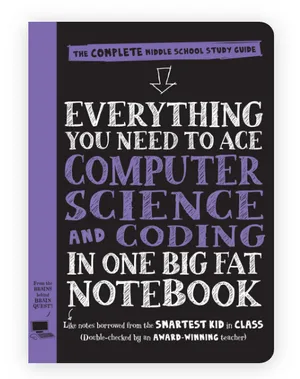
This computer science book is aimed at middle-school kids, to be clear. But it’s a wonderful starting point to understand the fundamentals of computer science and get to grips with coding.
It covers:
- Computing systems
- Binary code
- Algorithms
- Computational thinking
- Loops, events, and procedures
- Programming in Scratch and Python
- Boolean Expressions
- Web development
- Cybersecurity
- HTML
- CSS
The teaching style is designed to make it absorbable. The authors use mnemonic devices to help you remember tricky concepts. The book is stuffed with diagrams, definitions, and everything else you need to get to grips with the concept.
The best part for me? It assumes absolutely no prior knowledge. It’s a great place to get started learning computer science.
Useful review:
“I’m an adult who always felt intimidated by coding. This was a nice way to introduce me to the world of coding basics. Elementary but just what I needed to start learning.”
2. Beginning Programming All-In-One for Dummies 🔗
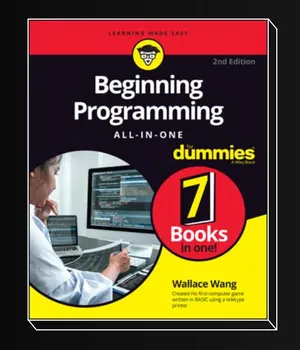
It’s all in the name, isn’t it? Some of the best computer science books treat you like you’re five. It’s a complex subject, and there’s no shame in starting at a very basic level.
This book covers both the fundamentals of programming as well as some updated use cases that will be good for you to learn, although many reviewers mention it’s heavy on C as a language. Here’s the curriculum:
- The basics of coding, including writing and compiling code, algorithms, and data structures
- Syntax of several different programming languages
- Interesting programming opportunities such as conducting biological experiments within a computer or programming a video game engine
- Cross-platform applications for desktop and mobile devices
Useful review:
“A great book for the following:
Beginners
People who want a summarizing overview on programming and related fields
People such as myself, confused and badly educated in programming and in need of a start over with simple words and answering the 5-whys questions.”
– Ahmed Hatem, a Goodreads reviewer.
3. Practical Programming: An Introduction to Computer Science Using Python 3.6 🔗
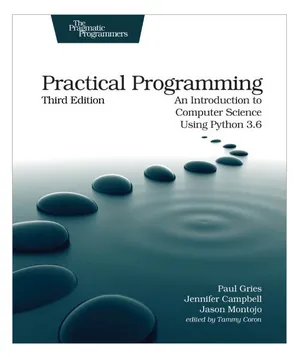
You may pick up a theme here: this is a proper computer science textbook, created for computer science students.
I like this CS book for beginners because it shows you the fundamentals through Python, which I believe is one of the predominant CS languages out there. By grounding it all in Python, it can walk through the concepts and theories, then use real code to show exactly what it means.
The curriculum in the book description is short: “Learn about design, algorithms, testing, and debugging.”
Useful review:
“It is a great book for people who want to dive into world of programming. Python language is programming language is fast to learn and easy to use for many applications. The book covers a lot of subjects in a comprehencive [sic] manner.”
– Erdem Yiğitolu, a Goodreads reviewer.
Top Computer Science Books to Get a Programming Job 🔗
The books above should help you get to grips with the concepts and theories that underpin computer science. However, as many self-taught computer scientists could tell you, there’s a lot you need to learn between understanding the theory of computer science and being ready to take on a computer science career.
1. The Self-Taught Programmer 🔗
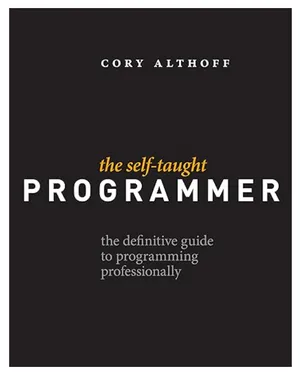
The author, Cory Althoff, taught himself to code. Then he got a programming job. And then he learned everything he really needed to know about coding. That entire journey is in this CS book.
It’s fewer fundamentals, and more practicalities. It contains a ton of job-specific tips and tricks for learning to code. I loved his best coding practices section, which is an often overlooked but very important habit to your long-term computer science career.
Here are the five sections covered in this book:
- Learn to program in Python 3 and build your first program.
- Learn Object-oriented programming and create a powerful Python program to get you hooked.
- Learn to use tools like Git, Bash, and regular expressions. Then use your new coding skills to build a web scraper.
- Study Computer Science fundamentals like data structures and algorithms.
- Finish with best coding practices, tips for working with a team, and advice on landing a programming job.
Helpful review:
“I am an HVAC designer by trade (no programming at all). After reading this book I feel equipped to change careers if I ever wanted to! This book lays things out very well and let’s you get straight to the coding! Don’t worry, theory is discussed too, but this book focuses on practicality…which is rarely used as a starting point in any engineering discipline. 10/10 would recommend.”
– Brian, an Amazon reviewer.
2. Clean Code: A Handbook of Agile Software Craftsmanship 🔗
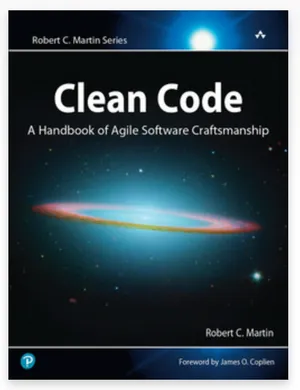
I love clean code so much that I included a whole book about the best coding practices.
To become a better (and more employable) programmer, it’s growing ever-more critical to learn how to code cleanly. This book involves a lot of reading code, so put on your glasses and get ready to learn by doing.
The curriculum is:
- The principles, patterns, and practices of writing clean code.
- Case studies of increasing complexity in cleaning up code from scruffy to efficient.
- Heuristics and “smells” gathered while creating the case studies, so you can better detect and fix unclean code.
This CS book hopes to teach you how to make your own code clean, and how to help anyone else on that journey, too. It touches on naming conventions, error handling, and readability. Overall, if you think you might want to be a developer, software engineer, project manager, team lead, or systems analyst, this book will be helpful.
Note: It primarily trucks with Java and object-oriented languages, so if that’s not your bag, this book may not be a great fit, though the theories of clean code will still be useful to learn.
Useful review:
“I would consider this an essential read for software developers. This book conveys the fundamentals of writing clean code, whose importance cannot be overstated.”
– Paul Sochiera, a Goodreads reviewer.
3. Code Complete 🔗
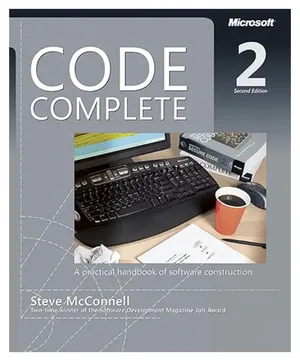
Code Complete is a CS book that helps developers write better (more efficient, faster, more useful) code for their employers. It’s won the popular vote – one StackOverflow question rated it the #1 programming book out there! It’s kind of like Clean Code, but from a career-oriented perspective. What I really love about it is how many real coding samples it uses to illustrate its points. It’s also better at being language-agnostic in its teachings.
Here’s the curriculum:
- Design for minimum complexity and maximum creativity
- Reap the benefits of collaborative development
- Apply defensive programming techniques to reduce and flush out errors
- Exploit opportunities to refactor–or evolve–code, and do it safely
- Use construction practices that are right-weight for your project
- Debug problems quickly and effectively
- Resolve critical construction issues early and correctly
- Build quality into the beginning, middle, and end of your project
Useful review:
“Every day I code, I apply a lesson I learnt from this book. It has helped a lot.”
– Elijah Oyekunle, a Goodreads reviewer.
I also really liked Erika RS’s review of the book, which did a high-level summary of every section.
4. The Pragmatic Programmer 🔗
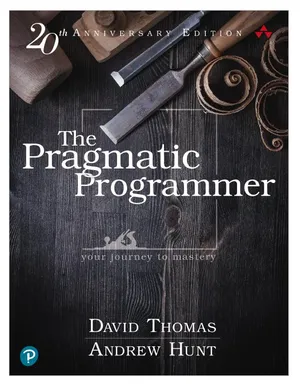
This is one of the old standbys of the genre. If you’re a programmer, you know and love PragProg. If you’re not yet, you will soon. It’s one of the rare computer science books that is fun, entertaining, and written to delight you as much as to entertain you. It makes for easy and enjoyable reading.
Here’s the curriculum:
- Fight software rot
- Avoid the trap of duplicating knowledge
- Write flexible, dynamic, and adaptable code
- Harness the power of basic tools
- Avoid programming by coincidence
- Solve the underlying problems of concurrent code
- Guard against security vulnerabilities
- Test ruthlessly and effectively, including property-based testing
The authors say their audience is for new coders all the way on up to software project managers. I did find I needed some knowledge to fully understand and appreciate this book. It’s written for people to improve themselves in their computer science career, not necessarily who want to start one with this book.
That said, it was a phenomenal read.
Useful review:
“The information contained in this book is essential for software developers who want to develop their skills and knowledge into a craft worthy of renown, to become masters of the field. It is essential for anyone working in a team or working solo.”
– Tamara, a Goodreads reviewer.
Top Specific Subject Computer Science Books 🔗
Computer science is an impossibly large field. You can read every single one of the books listed above and still need more knowledge in certain areas. Plus, most jobs will ask that you know some more than just the basics in certain areas.
Here are some more specialist books that are worth reading.
1. Cryptography Made Simple 🔗
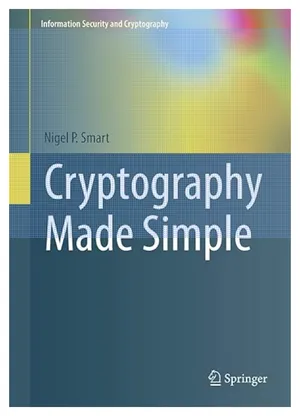
Anyone who claims to make learning cryptography simple must be looked at with a certain degree of skepticism. And yet, hats off to Nigel, he really did it. (Or as best as anyone can claim to make cryptography simple.)
This book is about the basics of infosec. If you want to read this, you should know basic discrete mathematics, probability, and elementary calculus before you dive in. It’s written as a textbook for college students, but it’s also recommended for professionals in infosec.
The curriculum is as follows:
- Some mathematical background, including logarithms, elliptic curves, primality testing, and lattices
- Historical ciphers, including the Enigma machine, Information Theoretic Security, and historical stream ciphers
- Modern cryptography basics, such as modern stream ciphers, block ciphers, hash functions, and public key encryption
- Advanced protocols, covering secret sharing schemes, zero-knowledge proofs, and secure multi-party computation
Useful review:
“It provides a good introduction to modern crypto as well as the maths behind it. It provides some great chapters about classical ciphers and why they are not sufficient. Proofs are often outlines or gloss over detail which makes the book a lot easier to read..”
– review from an unnamed Amazon customer.
2. Introduction to Algorithms 🔗
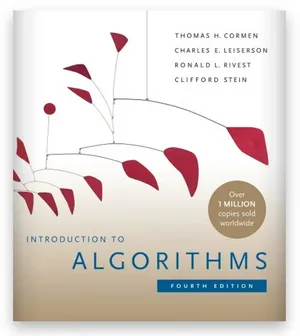
This computer science tome (I hesitate to even call it a book) is considered the algorithm textbook. What I love most about it is that it uses pseudocode. We know languages come and go like the tides; keeping it language-agnostic makes it relevant in perpetuity. This latest edition does make some concessions towards modernity, including chapters on bipartite graphs, online algorithms, and machine learning.
Here’s what you can expect this book to cover:
- Sorting and order statistics
- Data structures
- Advanced design and analysis techniques
- Advanced data structures
- Graph algorithms
Useful review:
“This book is a must-have on the shelf of any computer scientist, and any practical programmer who wants to write more efficient code. Pick it up!”
– Alex’s Goodreads review.
3. Computer Systems: A Programmer’s Perspective 🔗
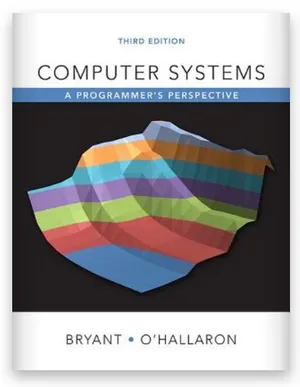
Hardware and architecture is a must-cover topic for any computer scientist. This book does a good job of addressing those knowledge gaps. You can expect to learn about hardware architecture, the operating system, and systems software.
It’s not geared for beginners: you’ll need access to a Linux system, and you should be familiar with C or C++.
Here’s the curriculum:
- Computer systems
- Machine-level representation of programs
- Processor architecture
- Optimizing program performance
- The memory hierarchy
- Virtual memory
- System-level I/O
- Network programming
- Concurrent programming
Useful review:
“This is an easy-to-follow book that covers how computers work from the level of processors up to web servers. It’s written for computer science students, and goes into a lot of detail about modern operating systems concepts such as virtual memory, processes, and signals. I had a lot of experience programming before reading this, but the book definitely clarified my thinking on many topics.”
– Morgan, a Goodreads reviewer.
4. The Practical SQL Handbook 🔗
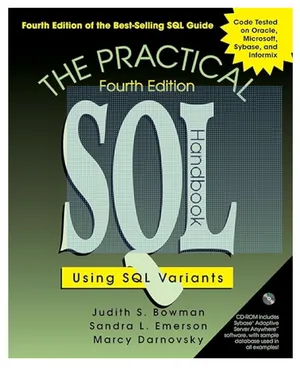
Databases aren’t just SQL nowadays, but SQL is still a great place to start with databases. This book is perfect to understand how to build tables, define the relationship between tables, load data into a database, query the database of information, and get a good foundation in the fundamentals of database design.
Curriculum notes:
- Detailed coverage of SQL commands for creating databases, tables, and indexes, and for adding, changing, and deleting data
- Using the SELECT command to retrieve specific data
- Handling NULL values (missing information) in a relational database
- Joining tables, including self joins and outer joins (ANSI and WHERE-clause syntax)
- Working with nested queries (subqueries) to get data from multiple tables
- Creating views (virtual tables) to provide customized access to data
- Using SQL functions
Useful review:
“I finally learned the right way to build databases for use with SQL. In the last eight years, it has repeatedly come off the shelf to solve my problems.”
– David, a Goodreads reviewer, reviewing an earlier edition.
Final thoughts on the best books for computer science 🔗
This is necessarily a subjective list - what worked for me might not be to your taste or needs. I recommend looking at Amazon reviews, Goodreads reviews (which are often less gamified and thus are more trustworthy), and the table of contents.
I also know a lot of these books are expensive. If you’re in a place where you can afford that, amazing - definitely support those authors. But if you can’t, don’t feel too guilty about looking for that PDF instead. Be careful, ensure you’re downloading legal material and that you don’t download any viruses by mistake. You should also check your local library – I’ve been surprised by how well-stocked mine is in computer science books.
Peruse this list and see which books look like they’ll solve your needs. The truly amazing thing about living in today’s world is you can teach yourself to become a computer scientist with just a little outside guidance. While blogs, videos, courses, and classes all have their place, it’s important to remember that books are a wonderful source of learning, too.